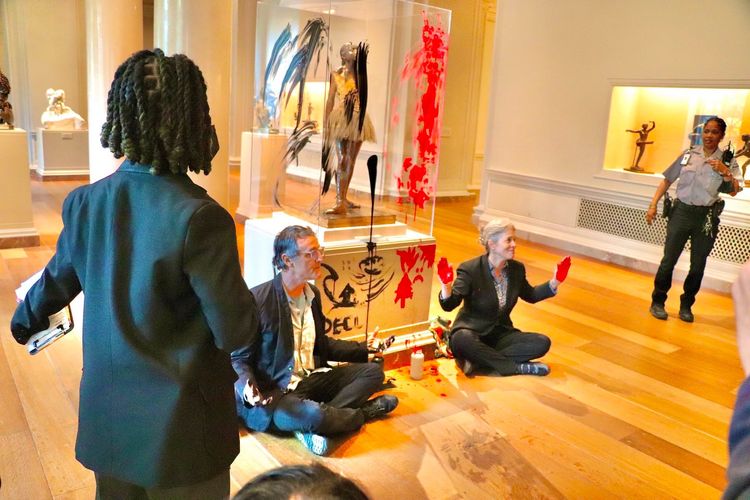The Sunrise Drama Is More Complicated Than It Looks
Hey Hot Cakes!
A lot of climate world spent last week watching Sunrise Movement fight amongst themselves in public. A lot of people had a lotta thoughts on the subject, but we couldn't help but feel like... damn, we hope they work it out. One of our researchers, Georgia Wright (also the co-host and producer of the great Inherited podcast) is a Sunrise member; she shared some great insights with us over text and we encouraged her to turn them into a post for the newsletter (thanks Georgia!). That's here, along with posts on re-thinking climate refugees, the latest climate coverage numbers, the California drought, the G7 Summit and climate, and of course the weekly digest of climate stories.
Happy reading!
Subscribe now for full access to all stories
The Sunrise Drama Is More Complicated Than It Looks
By Georgia Wright
On Tuesday, the former Creative Director of the Sunrise Movement dropped a bomb of a thread on Twitter. Alex O’Keefe, a prominent Black leader within the movement who led projects such as Ed Markey’s Green New Dealmaker ad, claimed that he had been terminated as a staff member after sending out an internal letter.
The thread aired a number of concerns and complaints about Sunrise Movement leadership, from the personal to the structural. However, the narrative immediately became more complex. Within hours, Sunrise Executive Director Varshini Prakash had tweeted, “Alex, I love you... but this isn’t what happened. You haven’t shown up for work in months.” The next day, Prakash’s response was corroborated by a public letter signed by the remaining fifteen members of Sunrise’s full-time Black staffers.
As a former volunteer for the NYC chapter of Sunrise, I was one of many young people on a rollercoaster of conflicting emotions last week. It feels impossibly sad and complex to see the movement’s noble goals derailed by such serious claims, and it would be so much easier to come down hard on one side or the other, to throw my weight ferociously behind a single narrative and be done with it. But black-and-white thinking doesn’t get at the root causes of anything, even if Twitter rewards it. We have to lean into the nuance here.
What is helpful, I think, is teasing apart the personal claims (O’Keefe’s firing and behavior as a staff member) from the larger claims (Sunrise doesn’t contribute to mutual aid, for example). Let’s leave the personal claims to the side, then, and focus on the structural ones instead.
Some of these bigger allegations: Sunrise is co-opted by megadonors, Sunrise doesn’t care about mutual aid, Sunrise is abandoning the Green New Deal, Sunrise is failing to recruit and maintain Black membership. The problem with analyzing these big claims (and, probably, the reason that many of them exist) is that Sunrise has scaled up MASSIVELY in a short period of time. They are not the first movement to experience growing pains as they leverage their newfound political power (a seat at the table in the Biden White House!) while simultaneously managing the concerns of their base (an ever growing number of disparate, volunteer-led hubs springing up across the country).
So while I can’t synthesize everything from my vantage point, here is what my own experience analyzing the movement has taught me: Sunrise, on the whole, is very white. They’ve struggled with their partnerships with POC-led organizations, even as they’ve made good-faith efforts to repair them. There is often tension between the (paid) members of the National staff and the (unpaid) members who are the lifeblood of the local hubs, like Sunrise NYC. It is a struggle to communicate between leadership and volunteers. Often, it feels like the local hubs are completely discrete organizations from the conglomerate of paid folks at the top. Burnout is a big problem, particularly for the unpaid volunteers. And of course, the fact that most positions are unpaid means that many low-income folks (primarily folks of color, then) have an intrinsic barrier to entry.
Zooming out even further, we stumble upon an even bigger truth: extractive capitalism and white supremacy are terrifyingly powerful forces. They have a way of poisoning even the most value-driven nonprofits and grassroots organizations, they force well-intentioned people to capitulate and make tough decisions, they try to make us fail. They are the cause of the climate crisis. They are why a generation of young people is in the position of self-governance in the first place – our government has become too broken by these forces to respond appropriately to the crisis that these forces, too, have caused. It is the challenge of all of our lifetimes to resist them. Our future quite literally depends on it.
Instead of “cancelling” Sunrise, or defending it mindlessly, we can use the issues that have been raised over the course of this week to analyze how these big, harmful, deeply rooted forces are trying to shape our interpersonal relationships, our organizations, and our world. Engaging deeply is our only chance of survival. So let’s get to it.
Oil and Gas Refugees
By Mary Annaïse Heglar
Last year, the New York Times and ProPublica collaborated on a masterful series on the climate migration phenomenon. It documented the places that are predicted to lose—and the one place that is expected to gain—population as the climate continues to warm, and all the legal red tape that keeps people from finding safe harbor.
I want to posit that there’s another rampant refugee creator out there that we don’t talk about nearly enough: the fossil fuel industry.
Subscribe now to read the whole story.
California's Drought Is a Window Into Our Climate-Constrained Future
By Amy Westervelt
California had a historically dry winter, which means the state's snowpack hit zero percent of average by June 1st. As a lifelong Californian, that is fucking terrifying. For everyone else, though, let me explain what that means: California's water is directly tied to the snowpack in its Sierra Nevada mountains, it provides a third of the state's fresh water supply.
Subscribe now to read the whole story.
No Return to Normal for Climate Coverage
By Mary Annaïse Heglar
As vaccines roll out—albeit with woeful inequity—the media landscape is finally offering space to more topics of discussion. While the pandemic might not be over, the panic about it is subsiding, at least in the United States. As far as media coverage on climate, though, a return to normal would be a mortal sin. We’ve never seen climate change get the robust, intersectional, vigorous discussion that it deserved. Thankfully, in May 2021, we saw signs that the media might finally be prepared to cover climate in a whole different way.
Subscribe now to read the whole story.
If the G7 Want to Stick it to OPEC Once and For All, They Should Act on Climate
By Amy Westervelt
You know what's really fucking telling about how serious the G7 countries are about taking on climate? It's not a named topic. Officially on the agenda for the days in which global leaders have said they will be discussing climate change are: "economic resilience, foreign policy and health." I guess human survival is tied to all three, but... damn, Gina!
Before we get into their current discussions, a brief bit of history on the G7.
Subscribe now for the whole story, including the history of the G7's relationship to OPEC and the way climate has turned up in this year's summit.
Digest
A curated list of this week's climate coverage.
Rising Temperatures, Rising Tides
Maps Show the Severe Drought Gripping California and the West by Nadja Popovich for The New York Times
Climate and nature crises: solve both or solve neither, say experts, by Damian Carrington for The Guardian
Landmark Report Links Earth's 2 Biggest Existential Threats for, by Dharna Noor for Earther
‘It was sad having to leave’: Climate crisis splits Alaskan town in half, by Julia Ilhardt for The Guardian
Why California is building new houses in the path of wildfires, by Nathanael Johnson for Grist
Ticks are out of control this year — it's not just your imagination, by Zoya Teirstein for Grist
It's raining 'forever chemicals' in the Great Lakes, by Jena Brooker for Grist
'Glacier Blood' Is the Latest Climate Change Horror, by Dharna Noor for Earther
We Broke a Carbon Dioxide Record Despite Pandemic Lockdowns, by Molly Taft for Earther
Turkey's Leaders Vow to Defeat Unprecedented Outbreak of 'Sea Snot', by Alyse Stanley for Earther
Scientists Extracted DNA From 'Blood Snow' in the Alps. Here's What They Found., by Becky Ferreira for Vice News
First heat wave of the season to bake Southern California amid worsening drought, by Hayley Smith for The LA Times
The Pine Island glacier is speeding up as its ice shelf disintegrates, by Sarah Kaplan for The Washington Post
Measurements of atmospheric carbon dioxide peaked at record levels in May, by Brady Dennis and Steven Mufson for The Washington Post
The Climate Presidency
For Lease: Windmill Space in the Atlantic Between Long Island and New Jersey by Lisa Friedman for The New York Times
Joe Biden Is Already Failing on Climate Policy, by Dharna Noor for Gizmodo
The Department of Energy is trying to make clean hydrogen this generation's 'moonshot', by Emily Pontecorvo for Grist
Kamala Harris told migrants 'do not come' but didn't address the biggest cause of displacement, by Adam Mahoney for Grist
The climate bill even Big Agriculture loves, by Tom Philpott for Grist
Biden Moves to Protest Tongass National Forest, Overturning Trump, by Dharna Noor for Earther
Biden Nominates Lawyer Who Represented Exxon to Major Treasury Role, by Dharna Noor for Earther
What Joe Manchin Doesn’t Get About the GOP’s Voter Suppression, by Katrina vanden Heuvel for The Nation
Chuck Schumer's Bipartisan Bill Is Bad for the Planet, by Kate Aronoff for The New Republic
Why Did Republicans Just Block Governor Roy Cooper's DEQ Nominee?, by Nick Martin for The New Republic
Collapse of Infrastructure Talks Risks Biden's Climate Priorities by Coral Davenport, Lisa Friedman and Emily Cochrane for The New York Times
Climate Accountability
In Nigeria, Gas Giants Get Rich As Women Sink into Poverty Women in Niger Delta say, by Shola Lawal in Vice News
Our Response to Climate Change Is Missing Something Big, Scientists Say by Catrin Einhorn for The New York Times
Leading investors urge governments to end support for fossil fuels, by asper Jolly for The Guardian
The company behind the Keystone XL pipeline ended the project on Wednesday, ending a fight that stretched more than a decade, by Brady Dennis and Steven Mufson for The Washington Post
Shell chief vows to bolster emissions strategy after court ruling, by Joanna Partridge for The Guardian
Poland to close Europe’s most polluting power plant by 2036, by Reuters Staff for Reuters
The Line 3 pipeline protests are about more than climate change, by Alexandria Herr for Grist
Cops Use Facebook to Target Line 3 Protest Leaders, New Docs Reveal, by Molly Taft for Earther
Gas and coal companies among recipients of $50m in Coalition grants from carbon capture fund, by Adam Morton for The Guardian
Wealthy nations breaking climate pledge with gas dash in global south, by Jonathan Watts for The Guardian
The controversy over Bill Gates becoming the largest private farmland owner in the US,by Rebecca Heilweil for Vox
How bankruptcy lets oil and gas companies evade cleanup rules, by Naveena Sadasivam for Grist
Why Haven't New York Democrats Made More Progress on Climate? By Kate Aronoff for The New Republic
Justice Is Justice Is Justice
Climate Fwd: How Disaster Aid Favors White People by Christopher Flavelle by The New York Times
The Keystone XL pipeline is dead. But the fight against similar projects is far from over, by Jariel Arvin and Vox
Climate Justice, for the First Time Ever, Is on the G7 Agenda, by Mark Hertsgaard for The Nation
Protestors descend on Minnesota's Line 3 pipeline construction site, by Joshua Partlow for The Washington Post
Glimmers of Hope
Owner cancels Keystone XL pipeline months after Biden revoked permit, by Reuters Staff for Reuters
Birth of 3 Wolf Pups Means Colorado Has Its First Native Wolves in 80 Years, by Ed Cara for Earther
Alaska Natives strike conservation deal in Bristol Bay that could impede Pebble Mine, by Joshua Partlow and Juliet Eilperin for The Washington Post
US building sector aims for net-zero emissions by 2040, by Ben Ikenson for the Washington Post
Climate in Culture
United's supersonic planes would be a 'massively polluting' disaster,by Shannon Osaka by Grist
What makes a 'regenerative' egg better than the rest?, by Eve Andrews for Grist
Illegal Cannabis Farms Are Making the Climate Crisis Worse, by Clara Murray for Vice News
Plus More
Half of clothes sold by online fashion brands ‘made from virgin plastic’, by Zoe Wood for The Guardian
We are running out of time to reach deal to save natural world, says UN talks chair, by Patrick Greenfield by The Guardian
Texas Republican asks: can we fix the moon’s orbit to fight climate change? By Edward Helmore for The Guardian
Great apes predicted to lose 90% of homelands in Africa, study finds, by Damian Carrington for The Guardian
Ban Ki-moon wants to solve the climate crisis with kindness, by Shannon Osaka for Grist
These Dream-like Photos of the Amazon Reveal a Hidden Nightmare Multispectral photography shows damage to, by Jody Serrano for Earther
All Cars Should Have Been Hybrids By Now, by Aaron Gordon for Vice News
What the Pandemic Felt Like From an Icebreaker Trapped in the Arctic, by Becky Ferreira for Vice News
How the Pandemic Changed Antarctica, by Leah Feiger for Vice News





Only paid subscribers can comment.
Please subscribe or sign in to join the conversation.